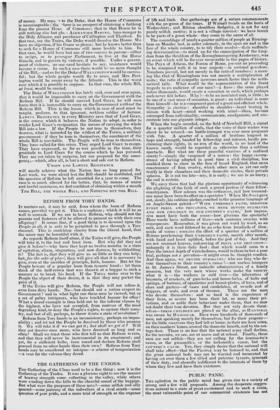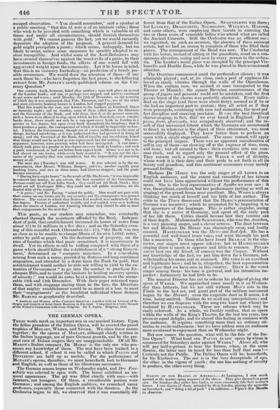PUBLIC PANIC.
THE agitation in the public mind has given rise to a variety of strong and a few wild proposals. Among the desperate sugges- tions natural to a state of great excitement and to such a crisis, the most vulnerable point of our commercial existence has not . escaped observation. " You should remember," said a• speaker at a public meeting, " that this 51. note is of no intrinsic value ; those who wish to be provided with something which is valuable at all times and under all circumstances, should furnish themselves with gold." We cannot gainsay the fact, yet we would earnestly deprecate the adoption of the proposal. A general demand for gold might precipitate a panic ; which seems, unhappily, but too likely to occur, unless some measures be speedily adopted to re- store tranquillity. And whilst some of the Anti-Reformers may have secured themselves against the worst evils of a panic, by their investments in foreign funds, the effects of one would fall with aggravated weight upon the community. Let it be borne in mind, that this is no visionary foreboding—no prediction of a barely pos- sible occurrence. We would draw the attention of those—if any such there be—who have forgotten the last panic, to the following • extract from Mr. JOPLIN'S newly-published volume on the Cur- rency Question.*
One country bank, however, failed after another ; runs took place on several of the London banks, and one, or perhaps two stopped, and matters continued to get worse and worse ; until Monday, the 12th of December, on the morning of which day it was announced, that Pole, Thornton, and Co., one of the oldest and most extensive banking houses in London, had stopped payment. That this would be the case, was known to the bankers in Lombard Street on Saturday night; and on Sunday, some of them called upon the Ministers and the Governor of the Bank, and told them; that if, at the present moment, such a house were allowed to stop, upon which no less than forty-seven country banks drew, there would not only be a run upon every bank in London in a greater or less degree, but upon every bank throughout the kingdom ; that it must produce a panic, the consequences of which it would be impossible to fore- tel. 1 believe the Government, though not of course indifferent to the state of things, deelMed interfering, as it was understood they had persisted in doing all along ; and the Governor of the Bank, full of timidity and irresolution, hoped that things would not be so had as was represented, but did nothing. The con- sequences, however, were precisely what had been anticipated. A run imme- diately took place in a greater or less degree on every bank in London ; and such
• a panic commenced, as had not before been experienced. Money was not to be had almost on any terms, while every body wanted it. " It was not the cha- racter of the security that was considered, but the impossibility of procuring money at all."
The next day (Tuesday) was still worse. It was ushered in by the
an-
nouncement, that Messrs. Williams, Burgess, and Co., another equally great • 'banking house, and two or three more, had likewise stopped ; and the panic became universal.
" During forty-eight hours," in the words of Mr. Huskisson,_" it was impossible to convert Into money, to any extent, the best securities of the Government. Persons could not sell East India Stock ; they could not sell Bank Stock ; they could not sell Exchequer Bills; they could not sell public securities, on the funded debt of the country."
" A panic," said Sir. Baring, "seized the public. Men would not part with their money on any terms, nor Tor any security, and the consequence was general distress. The extent to which that distress lout readied, was melancholy to the last degree. Persons of undoubted wealth, and real capital, were seen walking about the streets of London, not knowing whether they should be able to meet their engagements for the next day."
Tlis panic, as our readers may remember, was eventually checked through the assistance afforded by the Bank. Indepen- dent of gold, that establishment increased its issues of notes from
• about 17#to 23 millions in a few days ; and on the Saturday even- ing of this eventful week (December 12-17), "the Bank was run so close as to be unable to change fifteen of its own 1,0001. notes," either by gold or paper. On the destruction of property, on the ruin of families which that panic occasioned, it is unnecessary to dwell. Yet its effects would be trifling compared with those of a panic which should follow the establishment of a " strong Govern- ment," determined on " energetic measures." In a convulsion - arising from such a cause, preceded by distress and long-continued staeuation, and attended by a drain upon the Bank for gold, that • establishment would neither be able nor willing to yield to the en- treaties of Government " to go into the market to purchase Ex- • chequer Bills, and to assist the bankers by lending on every species ' of security ;' nor would its notes be at a premium, as on the memo- rable 12th and 13th December. With their paper returned upon them, and with stoppage staring them in the face, the Directors of that mighty establishment would be as much at a loss to meet their " engagements" as the humblest individual whose distress Mr. BARING so graphically described.
• Analysis and History of the Currency Question ; together with an Account of the Origin and Growth ofJoint Stock Banking in En timid. Comprised in a brier Memoir ,of the Writer's Connexion with these Subjects. By T. Joplin. Ridgway, 1832.



























 Previous page
Previous page